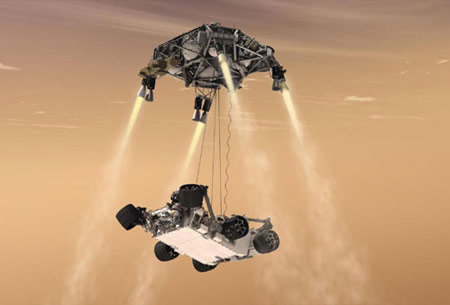|
 By the time the robotic Mars laboratory dubbed Curiosity streaks into the thin Martian atmosphere at hypersonic speed on Sunday night, the spacecraft will be in charge of its own seven-minute final approach to the surface of the Red Planet. |
|
The Mars rover Curiosity, on a quest for signs the Red Planet once hosted the building blocks of life, streaked into the home stretch of its eight-month voyage on Sunday nearing a make-or-break landing attempt NASA calls its most challenging ever. Curiosity, the first full-fledged mobile science laboratory ever sent to a distant world, was scheduled to touch down inside a vast, ancient impact crater on Sunday at 10:31 pm Pacific time (1:31 am EDT on Monday/0531 GMT on Monday). Mission control engineers at the Jet Propulsion Laboratory near Los Angeles acknowledge that delivering the one-ton, six-wheeled, nuclear-powered vehicle in one piece is a highly risky proposition, with zero margin for error. But on the eve of Curiosity's rendezvous with Mars, JPL's team said the spacecraft and its systems were functioning flawlessly, and forecasts called for favorable Martian weather over the landing zone. After a journey from Earth of more than 350 million miles (567 million km), engineers said they were hopeful the rover, the size of a small sports car, will land precisely as planned near the foot of a tall mountain rising from the floor of Gale Crater in Mars' southern hemisphere. Flight controllers anticipate clear and calm conditions for touchdown,slated to occur in the Martian late afternoon. There may be some haze in the planet's pink skies from ice clouds, typical for this time of year, with temperatures at about 10 degrees Fahrenheit. "We're on target to fly through the eye of the needle," Arthur Amador, the Mars Science Laboratory mission manager, told reporters at a briefing on Saturday, as Curiosity hurtled to within 2.8 million miles (4.5 million km) of its destination. Facing deep cuts in its science budget and struggling to regain its footing after cancellation of the space shuttle program - NASA's centerpiece for 30 years - the agency has much at stake in the outcome of the $2.5 billion mission. Mars is the chief component of NASA's long-term deep space exploration plans. Curiosity, the space agency's first astrobiology mission since the 1970s-era Viking probes, is designed primarily to search for evidence that the planet most similar to Earth may have once have harbored ingredients necessary for microbial life to evolve. (Read by Rosie Tuck. Rosie Tuck is a journalist at the China Daily Website.) (Agencies) |
以检测火星上是否曾存在生命组成物质为目标的美国火星探测器“好奇号”经过八个半月的航行,终于在上周日进入其航行的最后阶段,登陆火星。成败在此一举,美航天局称这是他们尝试过的最具挑战的一次着陆。 派往外太空的“好奇号”是第一座携带了一整套完整移动科学实验室的探测器,将于太平洋时间周日晚上10点31分(美国东部时间1点31分/格林尼治时间周一早上5点31分)在一处巨大的古老陨石坑内降落。 洛杉矶附近喷气推进实验室的任务控制工程师们承认,将一个重达一吨、装有六个轮子的核驱动探测器完好无损地送入太空是一项十分危险的任务,需要零误差操作。 但是就在“好奇号”和火星相会的前夜,实验室团队称探测器及其系统的运行堪称完美,天气预报也显示火星登陆地区天气状况良好。 在“好奇号”从地球出发,航行了3.5亿多英里(5.67亿公里)后,工程师们称他们期望这个小型跑车大小的探测器能够按照计划,精确地降落在火星南半球盖尔陨石坑内一个山脚下的平地。 飞行控制器需要可见度高、稳定的着陆环境,登陆预定于火星时间傍晚时分进行。到时,火星的当地气温将为华氏10度,由冰云形成的粉红色天空中可能会有雾霾出现,是一年中这个时候火星上的典型现象。 周六,当“好奇号”冲锋至离目的地不到280万英里(450万公里)时,火星科学实验室任务经理亚瑟•阿玛多尔在一封简报中告诉记者:“我们将完成穿越针眼的飞行目标。” 在面临科学预算大幅削减,航天局取消其30年来的中心事业——航天飞机计划之后仍需重新站稳脚跟的困境下,此次耗资25亿美元的任务成果在很大程度上对航天局而言生死攸关。 火星是美航天局长期深度太空探索计划的主要部分。“好奇号”是该机构自20世纪70年代“维京号”探测以来进行的首次天体生物学任务,其首要目的是探寻火星这颗与地球极为相似的星球是否曾蕴含可让微生物繁衍的必要元素。 相关阅读 (中国日报网英语点津 陈丹妮 编辑:Julie) |
|
Vocabulary: Mars rover: 火星探测器,火星车 make-or-break: 成败攸关的 impact crater: 陨石坑 slated to occur: 预期将发生 |
